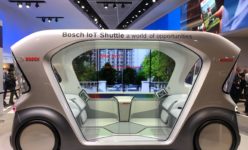The cities and municipalities in Germany have come under massive pressure not only since the Leipzig ruling on compliance with the set limit values for particulate matter and nitrogen oxides. Rapid population growth means that, according to estimates, more than two-thirds of the world’s population will live in cities in 2050.
Housing is becoming scarce, traffic and energy consumption in the cities are increasing and we are bound to find intelligent solutions for living together as quickly as possible.
The solution to many of these challenges lies in digitisation for our cities and communities. In the broadest sense of the word, these digitisation efforts are centred around the slogan Smart City. The aim is to make the future a reality thanks to smart, digital solutions in the areas of mobility, logistics, city administration, education, environment and private living conditions. In addition to quality of life, sustainability is a deliberate focus here.
European metropolises on their way to the Smart City.
Some European cities have been following this principle of smart cities for several years. The metropolises in Scandinavia such as Oslo or Copenhagen, Amsterdam, Barcelona, Paris or London, but also St. Gallen or Vienna have made their experiences with Smart City challenges in recent years. Efforts to make mobility more efficient include a mix of public charging stations, intelligent public transport, sharing models and alternative sources of electricity through photovoltaics or wind energy.
Amsterdam has so far set the standards in Europe for supplying the so-called “last mile”. By 2025, local public transport in the Dutch capital will be completely emission-free, both by water and land. The goods are delivered to cargo hubs around the city. Electrically powered electric vans, scooters and bikes supply from these distribution points to retailers in the urban area.
There are electric charging stations all over the city. Well-developed cycle paths and special multi-story car parks for two-wheeled vehicles encourage citizens to carry out their own transport without causing emissions. Car sharing and ride pooling support the individual traffic of locals and tourists. This interplay of smart infrastructure, control systems and digitally usable mobility offers makes Amsterdam a model for many large smart cities. Smart City is a development process for cities and municipalities with step-by-step solutions, which can be experienced and accelerated in the exchange of best practice between cities.
Post a Comment
You must be logged in to post a comment.






















